Robert Anning Bell
Robert Anning Bell RA (14 April 1862 – 27 November 1933) was an English artist and designer.[1]
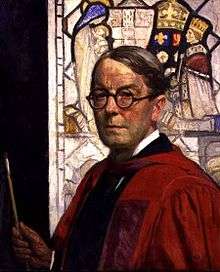
Early life
Robert Anning Bell was born in London on 14 April 1862, the son of Robert George Bell, a cheesemonger, and Mary Charlotte Knight.[2] He studied at University College School, the Westminster College of Art and the Royal Academy Schools, followed by a time in Paris.
Career
Bell was articled as an architect to his uncle, Samuel Knight.
On his return he shared a studio with George Frampton. With Frampton he created a series of designs for an altarpiece which was exhibited at the Arts and Crafts Exhibition Society and later installed in the Church of St Clare, Liverpool.
From 1895 to 1899 Bell was an instructor at the Liverpool University school of architecture. During this time he became associated with the Della Robbia Pottery in Birkenhead and also was becoming increasingly successful as a book designer and illustrator.
In 1911 Bell was appointed chief of the design section at the Glasgow School of Art, and from 1918 to 1924 he was professor of design at the Royal College of Art. He continued to paint and exhibited at the Royal Academy, the New English Art Club and the Royal Society of Painters in Water Colours,[3] as well as at the Society of Graphic Art's first exhibition in 1921.[4] He designed the great mosaic in the tympanum at Westminster Cathedral from sketches left by the architect John Francis Bentley; the work was completed in 1916.[5] Bell worked from 1922 on mosaics for the Palace of Westminster. Depictions of Saint Patrick of Ireland and Saint Andrew of Scotland were erected in the Central Lobby; in Saint Stephen's Hall, one panel was erected depicting Saint Stephen, King Stephen and Edward the Confessor and another showing Edward III presenting the design for St Stephen's Chapel to his Master Mason, Michael of Canterbury.[6] The last of these mosaics was unveiled in 1926.[7]
Personal life
His second wife was fellow artist Laura Richard whom he married in 1914[8] (he had previously been married to Amy Caroline Ditcham in 1900).[9] He had no children by either wife; Laura lost her only son (Charles Antoine Richard Troncy) by her previous husband (the artist Emile Troncy) in the First World War. He died in London on 27 November 1933, aged 71, and his ashes were interred in St James's Church, Piccadilly. A memorial to him lies above them.
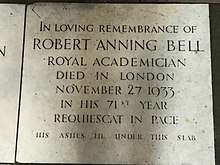
Gallery
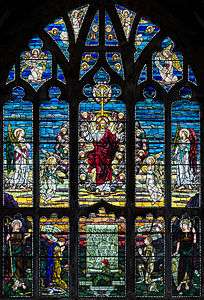 Stained glass window in St Matthew's Church, Paisley
Stained glass window in St Matthew's Church, Paisley The Chrystal Ball
The Chrystal Ball The Magic Chrystal
The Magic Chrystal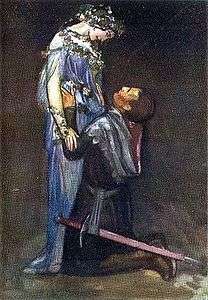 La belle dame sans merci
La belle dame sans merci Mary in the House of Elizabeth
Mary in the House of Elizabeth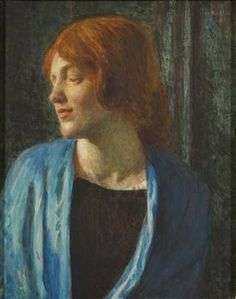 Portrait of a Woman
Portrait of a Woman A Flight of Fairies, book illustration in gouache
A Flight of Fairies, book illustration in gouache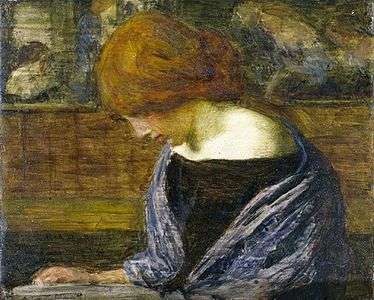 The Romance
The Romance Fragrant Posy
Fragrant Posy The Pool
The Pool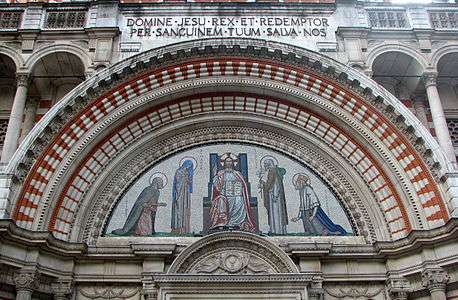 The tympanum at Westminster Cathedral
The tympanum at Westminster Cathedral
References
- "Bell, Robert Anning". Who's Who. Vol. 59. 1907. p. 130.
- England & Wales, FreeBMD Birth Index, 1837–1915, 1863 Apr–Jun, St Giles, Vol 1b page 466
- Rose, Peter, 'Bell, Robert Anning (1863–1933)', Oxford Dictionary of National Biography, Oxford University Press, Sept 2004; online edition, May 2008 . Retrieved 8 October 2008
- "List of Members", Catalogue of the First Annual Exhibition of the Society of Graphic Art, London: Society of Graphic Art: 45–48, January 1921
- John Francis Bentley's Westminster Cathedral, London, Banerjee, Jacqueline, the Victorian Web
- Eden, Alice, Robert Anning Bell (1863–1933) and the mosaics in the Houses of Parliament, British Art Journal (22 September 2009)
- St Stephen's Hall, Parliament of the United Kingdom
- England & Wales, FreeBMD Marriage Index, 1837–1915, 1900 Jul–Sep, Chelsea F.C., Vol 1a, page 822
- England & Wales, FreeBMD Marriage Index, 1837–1915, 1914 Jul–Sep Vol 1a page 1304
External links
| Wikimedia Commons has media related to Robert Anning Bell. |
- 20 paintings by or after Robert Anning Bell at the Art UK site
- Robert Anning Bell at Find a Grave
- UNCG American Publishers' Trade Bindings: Robert Anning Bell
- Charles Lamb's Tales from Shakespeare illustrated by Robert Anning Bell on the University of Florida's Digital Collections
- Profile on Royal Academy of Arts Collections